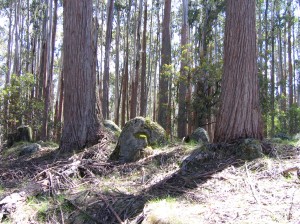Most mainstream religions pay little attention to place. While they all come from ‘somewhere’, be it Egypt and the other places visited in the wanderings of the Jewish people, or Buddhism’s home in North eastern India, they have largely become ‘generic’, unattached in practice and un-mindful of the value and reality of place.
Apart from the simple fact that faith is so mobile, traveling with diaspora and missionaries, monotheistic religion often deliberately cultivates this lack of attachment, warning of the ‘dangers’ of worshipping nature or spirits of place.

summer storm, Mt Nelse, Bogong High Plains
But is this part of the reason we face the ecological and social crisis we do? I am not suggesting that all cultures or communities living with a ‘localised’ spirituality are by definition benevolent, both to people and environment. Yet for most of our time on the planet, most of humanity has lived in a way that requires at least some attention to local ecology and natural processes, through farming, rural living, nomadic lifestyles and so on. Now, with more than half of humanity living in cities, will place-influenced religion and spirituality continue to decline in influence?
Australia is the most urbanised nation on the planet and has largely adopted lifestyles from elsewhere. We have a generic concept of ‘Australia’ and being Australian, a mixture of images from the coast, outback, bush and cities yet there is little appreciation of local place or bioregion. Our national character as commonly defined is about dealing with adversity, and often this includes the struggle to survive in a hostile land. Certainly this is changing but in a very low key kind of way. Living well in place can give grounding and a sense of appreciation and purpose but by its very nature, this approach tends to be quiet and unassuming, appreciating the personal dimension of the relationship between an individual and their life place. In contrast, many monotheistic religions are aggressively evangelical and push themselves into the social realm, where they may influence people. Many traditions that encourage appreciation for place, including bioregionalism and eco-feminism are out of vogue, and ‘place’ – that is our immediate ecosystems, rivers, plants and animals, weather patterns and so on – continues to be left out of the equation of what it means to be ‘Australian’.

alpine ash forest, Mt Stirling
It seems to me that the 21st century will be the century where we either ‘get it right’ in terms of living well on this planet, or when we slide, on a global scale, into competing enclaves of poverty and wealth, of states of totalitarianism, of fundamentalism and the ugliest manifestations of greed and capitalism. I think that re-discovering place, and the limitations and humility that must come with striving to live within ecological constraints, has the potential to steer us into a better future than what appears to be on offer right now, as we all consume faster, and live more generically, with less allegiance to the systems that have nurtured us since we became human.
There is a whole shelf of books about ‘space and place’ at Melbourne Uni library, but with little common thread.
As a student of geography I have been subjected to interminable discussion of ‘place’ since I was an undergrad in 1982,when we had to write an essay on what it meant. For a while we liked Nick Entrikin’s definitions, which are humanist, then in grad school these were not deemed radical enough (place became ‘territory ‘worth fighting for, or something being taken away by greedy capitalists and governments, as in East African parks). Now discussions draw on postmodernism – place is shorn of political content and is about ‘affect’ or its ‘affective dimensions’ and stirring feelings that it evokes (cf.Nigel Thrift) . Also places are reconstituted in art, buildings, and the like, drawing on a bricolage of images and evocations and jumbled up. I have never really understood what ‘affective dimensions’ of place are, although it may have something to do with yr descriptions.
The upshot is that people like certain places, but the geographers have just confused a simple concept since the 1960s.